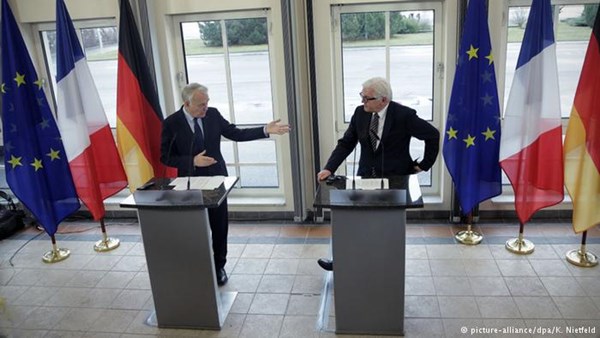French and German Foreign Ministers visit Kiev
On the 22nd of February, the Ministers of Foreign Affairs of Germany and France, Frank-Walter Steinmeier and Jean-Marc Ayrault, who arrived in Berlin on the same day, flew from the German capital for a two-day visit to Kiev.
They flew on board a German governmental plane immediately after a brief meeting and press conference in the departure lounge of the government terminal at the Tegel airport. The negotiating agenda was more than full.
Firstly, the Special Representative of the OSCE in the Trilateral Contact Group on Ukraine, Martin Sajdik, and the Deputy Chief of the OSCE Special Monitoring Mission in Ukraine, Alexander Hug, updated both Ministers on the current state of affairs. The meeting of German and French Ministers with the Prime Minister of Ukraine, Arseniy Yatsenyuk and the President of Ukraine, Petro Poroshenko was held on the same evening.
According to the visit protocol, the time limit for the first meeting was 70 minutes and 90 minutes for the second meeting. However, that was not the end of negotiations. The dinner to which only three Ukrainian Ministers were invited – the Minister of Infrastructure, Andriy Pyvovarsky, the Minister of Agrarian Policy and Food, Oleksiy Pavlenko and the Minister of Finance, Natalie Jaresko, was held at the German Embassy in Kiev at 9:30 pm.
As noted by the German observers, all three Ukrainian Ministers are considered to be the most active supporters of reforms; they are less susceptible to corruption than other representatives of the Ukrainian legislative and executive authorities. In addition, Natalie Jaresko is considered to be the favorite for the post of Prime Minister if Yatsenyuk resigns from office.
On Tuesday, the Ministers of the Federal Republic of Germany and France will have breakfast with their colleague Pavlo Klimkin. After that, they will proceed to the Verkhovna Rada of Ukraine, where they will meet with its Chairman and then with the leaders of all parliamentary factions.
In the joint call, published in the German newspaper Frankfurter Allgemeine Zeitung, Frank-Walter Steinmeier and Jean-Marc Ayrault stressed that the destiny of Ukrainian reforms depends not only on the President, the Prime Minister and the Government but also on the Parliament and opposition parties. They expressed in writing their hope that the decisive political forces of the country are ready to continue the course of reforms. At a press conference before the flight, Steinmeier and Ayrault took a more harsh tone.
“Kiev has to return to the path of reforms,” the first Foreign Minister stated. “We will try to convince their representatives that the faster reforms are implemented, the sooner confidence will be restored, and that is especially important to their international creditors,” the second Foreign Minister added.
In the language of diplomacy, these statements mean that Berlin and Paris believe that Kiev is no longer implementing reforms and the international community has lost confidence that they will do so.
In fact, the International Monetary Fund was strongly concerned by the government crisis in Ukraine. “The IMF program can hardly be successfully completed without significant efforts on improving the work of the Government and countering corruption,” as the Managing Director of the International Monetary Fund made perfectly clear in early February.
There is concern about the multi-billion dollar package of financial assistance to Ukraine, which the IMF is ready to provide once Ukraine implements economic and administrative reforms. The next tranche on this loan has already been frozen.
The journalists asked the Foreign Ministers whether Europeans have any other leverage over Kiev other than political calls and threats to suspend financial assistance. “Everything will depend on whether Kiev shares our assessment of the situation,” Steinmeier responded carefully. “We will try to convince the Ukrainians that the solution to their problem is in their hands,” his French colleague added.
“We are going to Kiev not to find a way out of the crisis for them, instead we are going to help them,” Jean-Marc Ayrault explained. Another objective of the visit of the two European Ministers to Kiev is to figure out what is really happening there.
The events of the past week caused bewilderment in Berlin – the demand for the resignation of the Prime Minister, the negative assessment of the Government’s work but with an insufficient number of votes in Parliament to express a vote of no confidence.
“We want to know what is happening under the surface of current events and what other influencing factors we will likely have to take into further account,” Frank-Walter Steinmeier stated.
It was also announced at the press conference in Berlin that a further round of talks in the Normandy format (Germany, Russia, Ukraine and France) at the level of the Foreign Ministers will be held in Paris on the 3rd of March. The meeting will focus on the progress of the implementation of the Minsk Agreements made last year. According to Steinmeier, the willingness for Russia to follow the Minsk Agreements and influence separatists is required for forward movement on this path, as well as the implementation of constitutional reforms in Ukraine, specifically, the adoption of new election laws and granting special status to regions that are controlled by separatists.
